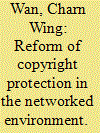|
|
|
Sort Order |
|
|
|
Items / Page
|
|
|
|
|
|
|
| Srl | Item |
| 1 |
ID:
103948


|
|
|
|
|
| Publication |
2011.
|
| Summary/Abstract |
This article provides empirical evidence of the inefficiency of contracting institutions (measured by high switching costs) among surgical instrument producers in Sialkot, Pakistan, even though it is an industrial cluster where manufacturers have access to a multiplicity of suppliers. Following the methodology of Johnson, McMillan and Woodruff (2002), we found that nearly 50 per cent of firms in the sample would reject an untried supplier offering a lower price. The decision to reject a prospective new supplier offering a 10 per cent discount was positively related to the complexity of the input and measures of relational contracting, and negatively related to a belief in informal contract enforcement mechanisms. Firms were more likely to switch to the prospective discount supplier when they were introduced through a business network. Belief in formal contract enforcement was not significant in any of the regressions.
|
|
|
|
|
|
|
|
|
|
|
|
|
|
|
|
| 2 |
ID:
085866


|
|
|
|
|
| Publication |
2008.
|
| Summary/Abstract |
On 15 April 2008, the Hong Kong government released its preliminary proposals on Copyright Protection in the Digital Environment, which cover the civil and criminal liabilities of online infringers and the role of online service providers (OSPs) in combating internet piracy. The preliminary proposals favor OSPs and users more than copyright owners. The government proposes that the OSPs, the content industries and users should voluntarily create a code of practice which defines the role and scope of OSPs in the fight against online piracy. The OSPs oppose any rules making them liable for copyright infringement and the safe harbor provisions. The content industries, in contrast, insist that, in line with international norms, both OSP liability and safe harbor provisions be written into the code of practice. I argue that, in the absence of any assignment of legal right to any party, the Coase theorem predicts that negotiations will fail. The key issue is which party should bear the transaction costs of copyright enforcement, because there are millions of online infringers; however, if the transaction costs of enforcing copyright in the networked environment are prohibitively high, the credibility of the copyright system will be undermined and online piracy will become commonplace.
|
|
|
|
|
|
|
|
|
|
|
|
|
|
|
|
| 3 |
ID:
088914


|
|
|
|
|
| Publication |
2009.
|
| Summary/Abstract |
It has been constantly asserted that the intellectual property (IP) system is an effective way to enhance creativity, technological innovations, trade and competitiveness. Others, however, maintain that the IP system may not necessarily be the most effective and appropriate way to fuel the economy. This article investigates the role that IP plays in the economic development of Malaysia from 1986 to 2006. In particular, the article examines the impact of IP-based reforms, which includes not only the IP laws but other IP-related policies with a view to determine how these policies contribute to economic development in Malaysia. For this purpose, the article starts with a brief summary of important IP-related policies. Then the article proceeds with an analysis of trends in IP applications such as patent, trademark and industrial design application. Using data such as numbers of IP filing and grant, this article suggests ways in which the reforms in IP-related policies could have supported growth or could have directly influenced trends in IP application in Malaysia. The article further examines the growth of IP applications in four industrial sectors in Malaysia, i.e. automobiles, information technology, pharmaceuticals, and information and communications technology.
|
|
|
|
|
|
|
|
|
|
|
|
|
|
|
|
|
|
|
|
|